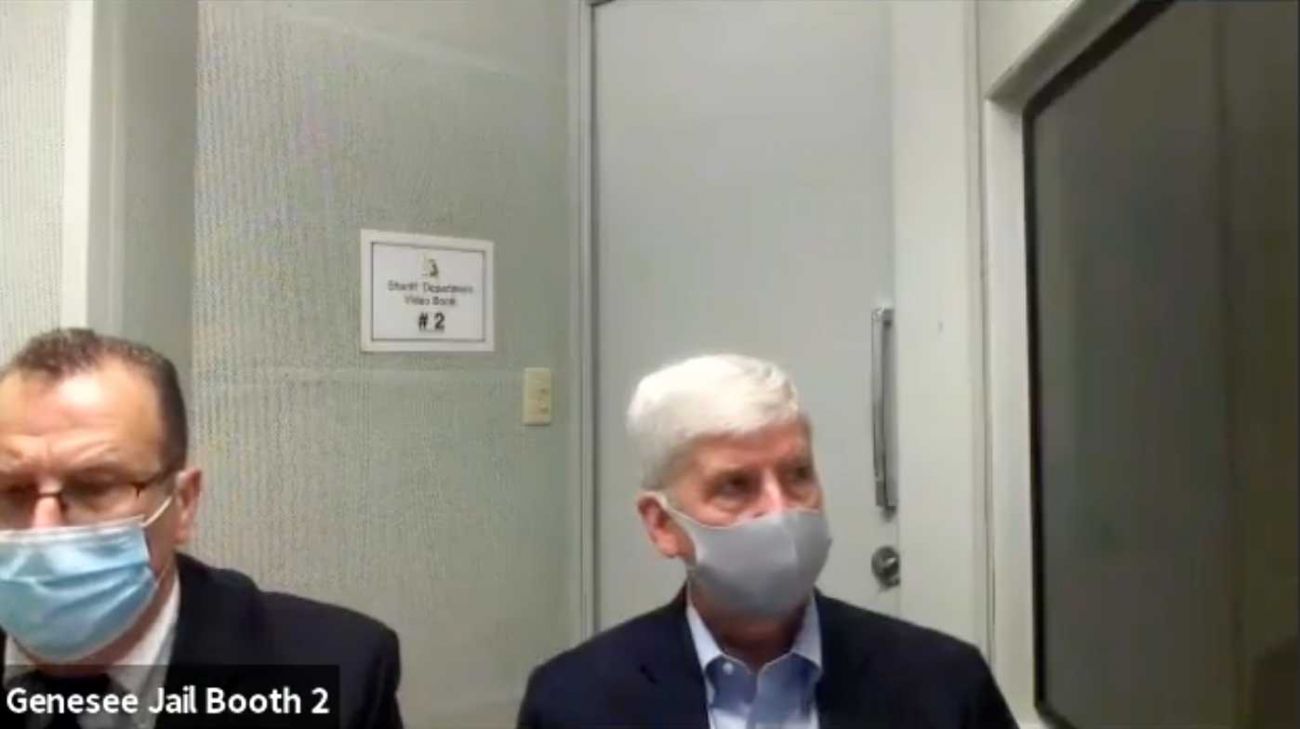Snyder, top aides charged in Flint water crisis. Is that justice?

LANSING —Former Gov. Rick Snyder is accused of willfully neglecting his duty, two of his top health officials are accused of involuntary manslaughter and key aides are accused of extortion and perjury over the 2014 Flint water crisis.
Michigan Solicitor General Fadwa Hammoud and Wayne County Prosecutor Kym L. Worthy announced new charges Thursday in Flint, nearly seven years after a fateful water switch caused catastrophic lead contamination that coincided with two outbreaks of Legionnaires’ disease and 12 deaths.
Nine charged in Flint water crisis
Here’s a list of charges announced Thursday by Michigan prosecutors related to the Flint water crisis that contaminated the mid-Michigan city’s water supply.
- Rick Snyder, former governor: two counts of willful neglect of duty – each a one-year misdemeanor and/or $1,000 fine
- Rich Baird, former senior adviser to Snyder: one count of perjury – a 15-year felony, one count of official misconduct in office – a five-year felony and/or $10,000 fine, one count of obstruction of justice – a five-year felony and/or $10,000 fine, one count of extortion – a 20-year felony and/or $10,000 fine
- Nick Lyon, former director of Michigan Department of Health and Human Services: nine counts of involuntary manslaughter – each a 15-year felony and/or $7,500 fine; one count of willful neglect of duty – a one-year misdemeanor and/or $1,000 fine
- Eden Wells, former chief medical executive of Michigan: nine counts of involuntary manslaughter – each a 15-year felony and/or $7,500 fine; two counts of misconduct in office – each a five-year felony and/or $10,000 fine; one count of willful neglect of duty – a one-year misdemeanor and/or $1,000 fine
- Jarrod Agen, former director of communications and former chief of staff for Snyder: one count of perjury – a 15-year felony
- Gerald Ambrose, former Flint emergency manager: four counts of misconduct in office – each a five-year felony and/or $10,000 fine
- Darnell Earley, former Flint emergency manager: three counts of misconduct in office – each a five-year felony and/or $10,000 fine
- Howard Croft, former director of Flint’s Department of Public Works: wwo counts of willful neglect of duty – each a one-year misdemeanor and/or $1,000 fine
- Nancy Peeler, current state manager of early childhood health: two counts of misconduct in office – each a five-year felony and/or $10,000 fine; one count of willful neglect of duty – a one-year misdemeanor and/or $1,000 fine
Source: Michigan Attorney General Dana Nessel’s office
Prosecutors, who had dropped earlier charges to relaunch the probe in 2019, said they are legally barred from discussing evidence that was presented in secret to Judge David J. Newblatt, who acted as a one-man grand jury and handed down the indictments.
Attorneys for Snyder and his aides accused Democratic Attorney General Dana Nessel’s office of withholding information and political retribution against the former Republican governor. Prosecutors denied those claims and promised evidence will be revealed in future court proceedings.
- City of Flint, McLaren join water crisis settlement, bringing pot to $641M
- Gov. Whitmer unveils $500M spending strategy for Michigan water
“This case is about justice, truth, accountability, poisoned children, lost lives, shattered families that are still not whole and simply giving a damn about all of humanity,” Worthy said in a Flint media event.
Snyder, who was arraigned Wednesday morning and pleaded not guilty, is the first Michigan governor to face criminal charges related to his time in office.
The charges against him are relatively minor, however: He is charged with two misdemeanors, each punishable by up to one year in prison or a $1,000 fine. But if convicted, legal experts say the wealthy businessman could also be forced to pay restitution to Flint victims.
Several Sndyer appointees and aides face more serious charges.
Former Michigan Department of Health and Human Services Director Nick Lyon and former Chief Medical Executive Eden Wells are each charged with nine counts of involuntary manslaughter, felonies punishable by up to 15 years in prison.
Rich Baird, a top aide to Snyder, faces multiple felonies each punishable by between 5 and 15 years in prison. He is accused of misconduct in office, perjury, obstruction of justice and extortion for “threatening a state-appointed research team during their investigation into the source of the Legionnaires’ disease outbreak,” Hammoud said.
Jarrod Agen, who served Sndyer as communications director and chief of staff, is accused of perjury, a 15-year felony. And two former emergency managers, Darnell Earley and Gerald Ambrose, have been charged with multiple felony counts for alleged misconduct in office.
“There are no velvet ropes in our criminal justice system,” Hammoud said. “Nobody, no matter how powerful or well connected, is above accountability when they commit a crime.”
Defense lawyers: Not guilty
Snyder defense attorney Brian Lennon called the charges against his client “wholly without merit” and said he is confident the former governor will be “fully exonerated if this flimsy case goes to trial.”
“Today’s charges do nothing to bring justice to the people of Flint,” Lennon said in a statement following Thursday morning’s arraignment. “These unjustified allegations do nothing to resolve a painful chapter in the history of our state. Today’s actions merely perpetrate an outrageous political persecution.”
Lennon claimed Nessel and her team’s media conference show they prefer to “prosecute in the court of public opinion rather than in a court of law.” It would be a “travesty to waste additional taxpayer dollars pursuing these bogus misdemeanor charges,” he said.
Worthy, a Democrat appointed by Nessel, defended the investigation, which she and Hammoud took over in 2019.
“This case has nothing whatsoever to do with partisanship,” Worthy said. “It has to do with human decency. A complete abandonment of the people of Flint. And finally, finally holding people accountable for their alleged unspeakable atrocities that occurred in Flint all these years ago.”
Lyon and Wells will face manslaughter charges for the second time. Prosecutors had dropped earlier cases against them but said they enlisted a group of “world renowned” experts to study additional Legionnaires’ disease deaths.
Lyon is innocent, according to defense attorney Chip Chamberlain, who noted his client did not decide to switch Flint’s water supply in 2014 and had “nothing to do with handling the water” in the city.
“Our hearts go out to Flint citizens who have endured the fallout from that decision,” Chamberlain said in a statement. “But it does not help the people of Flint — or our criminal justice system — for the state to charge innocent people with crimes.”
As state health director, Lyon acted “on the advice of highly trained” epidemiologists, scientists and other experts who were following the data, Chamberlain said.
“It’s apparent that once again, the attorney general has ignored the facts and the evidence. This is a dangerous day for state employees.”
Baird, a former business mentor who joined Sndyer as a top aide in the governor’s office, is accused of perjury, misconduct in office, obstruction of justice and extortion related to the Flint water crisis.
His attorney, Randall Levine, called the accusations “baseless” and said his client is innocent.
“The people of Flint are justifiably upset and angry about what happened in Flint,” Levine said in a statement. “Their government failed them at so many levels. However, the evidence will show that Rich Baird is NOT responsible for what occurred to the folks in the town where he grew up. I expect that he will be vindicated.”
Difficult to prove
Judge Elizabeth A. Kelly set bail for Lyon at a $200,000 cash surety bond and ordered him to surrender his passport given “the serious nature of the allegations” of involuntary manslaughter, which the court takes “very seriously.”
Snyder was arraigned on a $10,000 personal bond and cannot leave the state without permission.
Lennon, his defense attorney, successfully fought stricter bail terms, reminding the presiding judge his client is “the first former governor since William Milliken who has remained in the state of Michigan” and “is not a risk of flight or a danger to the community.”
Hammoud declined to disclose the evidence against Snyder, saying she is legally prohibited from discussing details of the one-judge grand jury.
“But what I can tell you is, based on the evidence, we charged because we believe that his willful neglect of duty amounted to a crime,” she said.
Willful neglect of duty is “not an easy thing to prove, because you’ve got to show a state of mind,” said Mike Nichols, a criminal defense attorney based in East Lansing.
“You’ve got to show they knew what the consequences were probably going to be, and yet still took the act or failed to take an act.”
Former Attorney General Bill Schuette had charged several state officials with willful neglect of duty in 2016, including former emergency managers Earley and Ambrose and drinking water officials in the Michigan Department of Environmental Quality.
Two DEQ officials — Liane Shekter-Smith and Adam Rosenthal — settled their cases by pleading to lesser charges and were never convicted of willful neglect.
Nichols said that, while Snyder faces misdemeanors, he could be forced to pay restitution to Flint victims.
“In any criminal prosecution, the judge is obligated to calculate restitution and impose restitution,” Nichols said. The amount has to be justified, but “if it’s ordered, you can’t discharge it, you’re pretty well stuck.”
That said, if he is ordered to pay restitution, Snyder would be entitled to a “set-off” for any money awarded to victims in other cases.
That means a $641.2 civil settlement in a Flint water crisis lawsuit, which is pending approval from a federal judge, could reduce or even wipe out any restitution Snyder or others are ordered to pay.
“The number ordered would sound big, but it wouldn’t be as big.”
Michigan Environment Watch
Michigan Environment Watch examines how public policy, industry, and other factors interact with the state’s trove of natural resources.
- See full coverage
- Subscribe
- Share tips and questions with Bridge environment reporter Kelly House
Michigan Environment Watch is made possible by generous financial support from:
Our generous Environment Watch underwriters encourage Bridge Michigan readers to also support civic journalism by becoming Bridge members. Please consider joining today.
See what new members are saying about why they donated to Bridge Michigan:
- “In order for this information to be accurate and unbiased it must be underwritten by its readers, not by special interests.” - Larry S.
- “Not many other media sources report on the topics Bridge does.” - Susan B.
- “Your journalism is outstanding and rare these days.” - Mark S.
If you want to ensure the future of nonpartisan, nonprofit Michigan journalism, please become a member today. You, too, will be asked why you donated and maybe we'll feature your quote next time!






